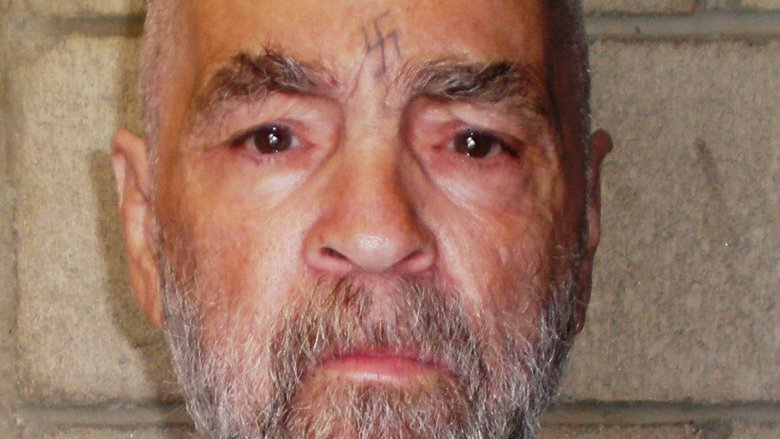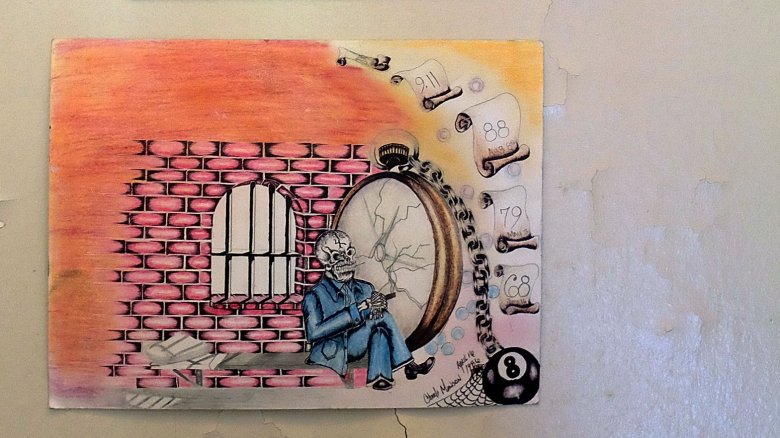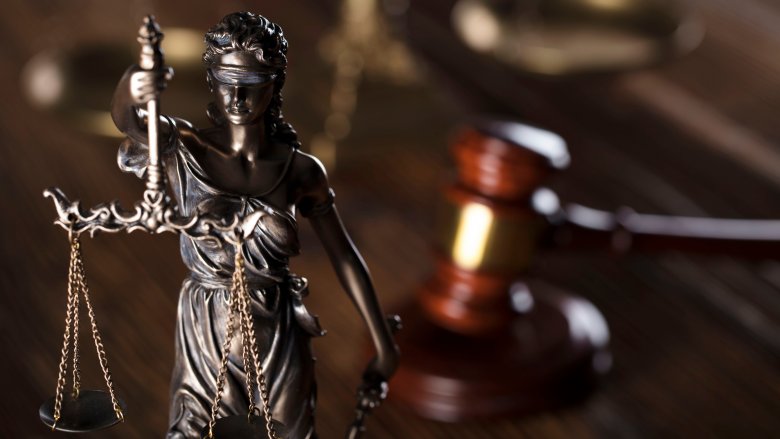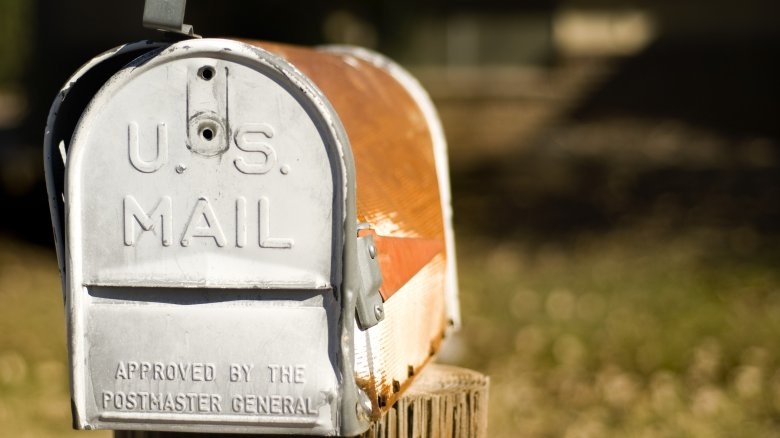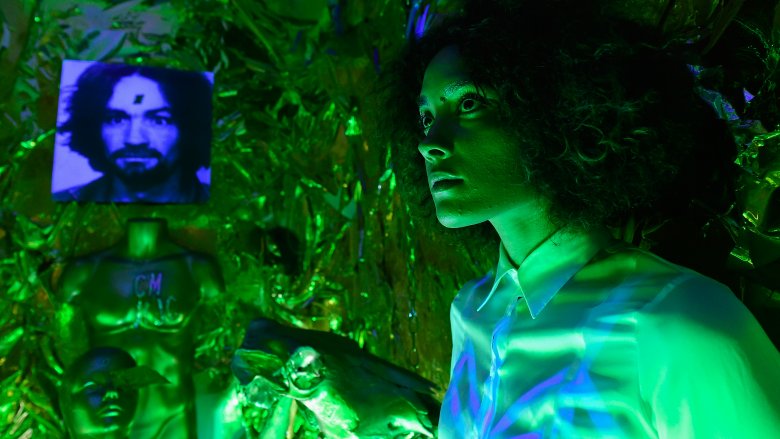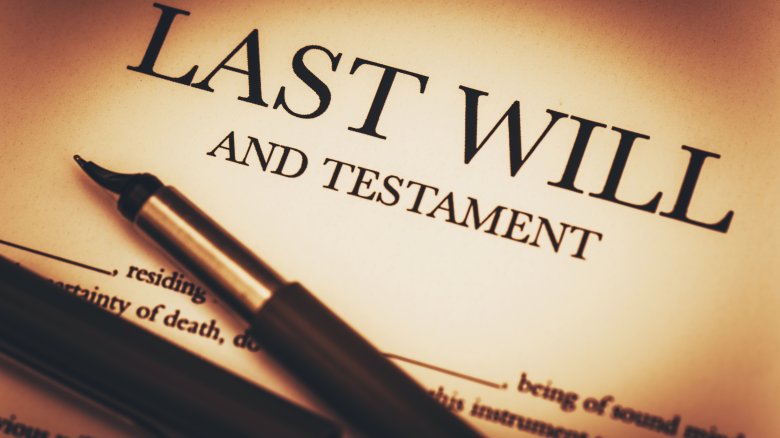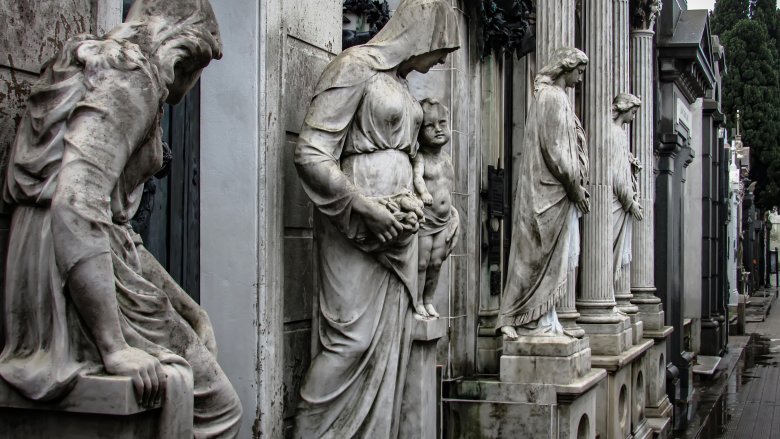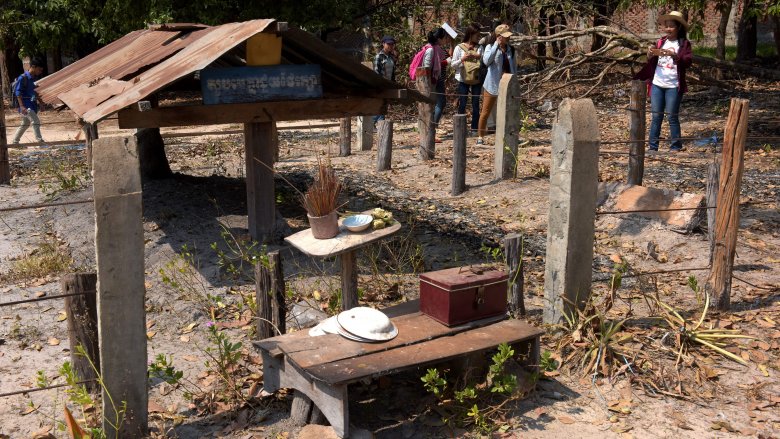The Real Reason Charles Manson's Body Has Been On Ice For Months
The cult of the celebrity criminal is a strange thing, and when Charles Manson died on November 19, 2017, it seemed like this was one star only a few people would be sad to see burn out. Then in the weeks after his death, a strange saga started to unfold. It was still going months later, Manson himself hadn't been buried, and his estate hadn't been settled. Not by a long shot. So why was Manson's body kept on ice for months after his death? It's a weird thing.
What's at stake?
The short answer to this whole issue is that there's a massive fight going on for control over who gets control of Manson's estate and what happens to his body, and some of the people fighting aren't even related to him.
According to Forbes, the most valuable part of Manson's estate is possibly the most creepy. Manson left behind several wills. (It's more complicated than that, but we'll get there in a minute.) The wills dealt with who got control of his image, the publishing rights to his story, and control of his music and songs. Manson's songwriting endeavors are a weird footnote to his story, along with his connection to the Beach Boys and his dreams of becoming a serious musician. Given what an infamous cult figure Manson's become, there's a possibility his image and songs alone are worth a fortune.
Strange, but true. Two of Manson's songs were commercially recorded (Look at Your Game, Girl by Metallica and Never Learn Not to Love by the Beach Boys). So there are royalties from those, and there's the cash that stands to be made from the sale of his personal belongings. Manson's bankability is only going to rise, especially with movie plans in the works. Is this all in questionable taste? Absolutely.
California law is complicated
Manson left behind a legal mess, and the laws of the state of California aren't working in favor of a quick and easy settlement. Tanya D. Marsh is a law professor at Wake Forest University, and she says (via The Conversation) there are a whole bunch of issues here.
California law says the rights of the deceased pass first to a person they've appointed, then to a spouse, then adult kids, then parents, then adult siblings, and finally — potentially — to adults defined as having "next degrees of kinship." Given how odd Manson's family is, that's not a clear-cut matter.
There's also a bizarre caveat. When someone in California dies without any assets, the state can step in and claim the body for medical research or educational purposes. Since Manson died in jail, there was supposed to be a next of kin form filled out, and if 10 days pass with no one coming to claim the deceased inmate, they're officially "unclaimed." Complicated and sometimes contradictory? Yes.
The son: Michael Brunner
By February 2018, CNN reported four frontrunners emerged as having arguable claims to Manson's remains and his estate. One is Michael Brunner, who says he has full rights to the Manson estate and that he's Manson's only living son.
Newsweek says Brunner is actually Manson's third son, and his mother is former "Family" member Mary Brunner. If his name doesn't sound too familiar, there's a reason for that. He was named Valentine Michael Manson when he was born (and you might recognize that name if you watched the semi-fictional miniseries Aquarius, per Bustle). Brunner's grandparents raised him from the time he was 18 months old, and he previously said he felt no connection to his father, even tearing up the single letter he'd received from him without reading it.
He would cremate Manson's body, and he says he's filing the claim solely to keep profits from being made off Manson's estate. (As for Mary Brunner, she wasn't a part of the killings as she was already in jail for credit card fraud. She's been released since, and largely silent.)
The grandson: Jason Freeman
Freeman is the son of Charles Manson Jr., and in 2012, he openly started talking about his bloodline. According to CNN, he did it in part because he wanted Manson's biological descendants to stop feeling like they had to hide who they were. Part of that is rooted in his own unhappy family, as he never really knew his father or grandmother. Freeman's father largely stayed away, and he was never allowed to ask his grandmother Rosalie about her infamous husband.
Freeman filed extensive documentation with the courts proving he was legitimately Manson's grandson, and he says he had also started talking to him in the final years of his life. While Freeman's father — the missing link here — shot and killed himself in 1993, Freeman's relationship with his infamous grandfather is a little different. CNN quoted him as saying, "I love my grandfather. Everyone makes mistakes. I'm not talking about the mistakes he's made. I'm not making a judgment, I don't want anyone to judge me." His plans for the estate involve cremation and donating any and all money.
The ... other son?
CNN says another contender for Manson's body and estate is Matthew Robert Lentz, who also goes by Matthew Roberts. If you've been keeping up with the Mansons, you might have heard of his part in the saga. It started in 1998, when Roberts started looking for his birth parents. He tracked down his mother, and eventually, she told him who his father was: Charles Manson. She detailed the orgy where her pregnancy happened, and that's when Roberts looked in the mirror and realized he looks strikingly similar to the master manipulator.
So, he wrote to Prisoner B33920, and CNN says Manson not only wrote back, but seemed to confirm what he'd already been told. Roberts wasn't able to get a DNA sample from Manson directly, but Jason Freeman did agree to offer up his DNA for analysis. If they had the same Y chromosome, they were related.
The results weren't what Roberts was expecting: DNA said he wasn't a Manson. His story doesn't end there, though, because while he might not have the right Y chromosome, he does have a will identifying himself as the sole heir.
The pen pal: Michael Channels
There's one more person who threw his hat in the ring to become a contender for the Manson estate. Michael Channels is what CNN calls a "memorabilia dealer," and he claims he's been friends with Manson for around 30 years. They were so close, in fact, that he also has a will naming him as the only heir and claiming Manson's flesh-and-blood sons were disinherited.
The LA Times says Channels was one of the first to file a claim, along with Freeman. He says if his will is honored, he plans to cremate the body and then figure out what to do with the rest. Channels once ran the website MansonsBackPorch.com, where he had an online museum, a series of recorded conversations, and an "under construction" page slated to be a store of limited Manson items. The entire site has since been removed.
Where are Manson's other heirs?
Is it possible there are other Manson children out there? Absolutely, and they might not even know who they are. In 1981, Manson sat down for an interview with Tom Snyder, and the subject came up. He replied that he didn't even know how many children he had, saying, "Uh, I don't know. I've got lots of children, man. Uh, in fact sometimes I even think that you're a child."
That might not make a whole lot of sense, but it's not entirely surprising, either. Part of the Manson family's free love policy involved pregnancies and babies, so it's hard to tell how many he may have ended up with. International Business Times says three men have been identified as Manson sons, and the oldest is Jason Freeman's father, Charles Manson Jr. Freeman later took his stepfather's name and became Jay White, then ultimately committed suicide because he was unable to come to terms with who his father was. The middle son — Leona "Candy" Stevens' son Charles Luther — has been largely missing from public view. What little is known of him, Heavy suggests, seems to indicate he has a daughter. And the third son is part of the estate claim: Michael Brunner.
Two different wills
When it came time for the courts to get involved, two different wills were put into play. The problem is, CNN says, they both have issues.
The Channels will was written on February 14, 2002, and seems to leave every single thing to him. There's a note: "I have disinherited both known sons and any unknown children in the present and in the future. ... I am not in the best spot to rest in peace." It was witnessed by two people, but one of them was Channels himself. That goes against the caveat in the law saying the two witnesses have to be parties with no stake in the will whatsoever. There's also the fact that the signature predates the will by four days.
Roberts has a will, too. This one names him as heir and another Manson friend, Benjamin Gurecki, as executor. Gurecki's been in the Manson world for a while, selling memorabilia, and this will only has a single signature. Again, there's the problem.
The problem with notorious burials
What to do with Manson's estate is tricky enough, but what to do with his body is just as complicated. It is when any notorious figure dies, for a few reasons.
Take the case of Tamerlan Tsarnaev, who was a suspect in the Boston Marathon bombing when he died of his injuries. NBC Connecticut says no one wanted to have anything to do with burying him, and cemeteries were refusing to accept the remains. Osama bin Laden got a burial at sea, partially in order to observe Islamic burial traditions, and partially to keep any grave site from becoming a shrine — a very real concern, says CNN.
It's happened before. Neo-Nazis turned Rudolf Hess's grave into a major destination, and it got so bad the family had him exhumed, cremated, and scattered at sea. Argentina, The Guardian reports, has "a problem with dead Nazis." No one wanted Erich Priebke's body when he died, and he was turned away from Rome and Berlin. It's a tricky bit of business with no good answer, and some even suggest the Nazis should be buried in a public way, with the sites serving as a reminder of the atrocities they committed.
What happened in other infamous cases?
What happens to Manson's body is ultimately up to whoever wins in court, and several of the contenders have said they would cremate him and scatter his ashes. There's a bit of precedent for that, too. NBC Connecticut says Ted Bundy was cremated, and in a disturbing twist, he requested his ashes be scattered in the same area of the Cascade Mountains where he left a few of his victims.
Jeffrey Dahmer's body was also at the center of a legal battle, with his father wanting cremation and his mother wanting to donate his brain to science to try to figure out if there was anything they could learn about why he'd done such absolutely horrible things. He was ultimately cremated, each parent getting part of his ashes. Timothy McVeigh and Columbine school shooter Dylan Klebold were cremated, while Eric Harris was buried in a secret location.
Sometimes, not even cremation is enough to keep a notorious resting place from becoming a weird sort of shrine. Pol Pot was cremated, and left in an unguarded, earthen-mound grave (above). Most of his ashes have been looted by tourists.
